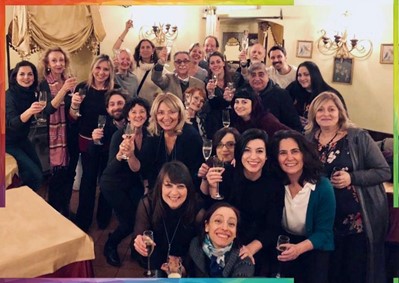Last week Dilit International House Rome turned 46. It truly is a great achievement and through the various years the team have worked hard to build a strong reputation in the teaching of Italian as a second language with the communicative approach.
 We interviewed Teacher Trainers Luigi Micarelli and Luisa Guerrini from the Teacher Training Department at Dilit International House Rome about teaching online with the communicative approach. Hear what they had to say.
We interviewed Teacher Trainers Luigi Micarelli and Luisa Guerrini from the Teacher Training Department at Dilit International House Rome about teaching online with the communicative approach. Hear what they had to say.
We have been in shutdown for over a month now. Spring is in the air. Only the gardener goes to school to water the plants. We are online. We weren’t ready. We weren’t prepared, neither mentally nor practically. But after the initial shock, we looked each other in the eye, collected our thoughts and told each other “what we are good at doing in the real class we should be able to do in the virtual class”. If we have now reached a certain competence is a question that only our online students can answer. But on the whole things seem to be going quite well.
Certainly, things are different: the setting, the Internet connection, the distance, the energy and enthusiasm of the class which is transmitted to those less motivated students, the teacher’s view of the class as a whole etc. During our countless debates and meeting, we teachers have been going over and comparing our online experiences, finding feasible solutions to critical issues, experimenting with new techniques. But ever since our first meeting there has been a question which lingers in our minds: Do we have somehow to reach a compromise between the communicative approach and online teaching?
We have absolutely no intention here of presenting a treatise on the communicative approach, we would just like to make some points clear and highlight some others.
To merit the term communicative we must, first of all, observe what real communication is. And respect the principles in class. A fundamental point is that real communication is not created by a series of phrases, but rather by a text full of cohesion and coherence. The teacher’s job is to prepare students as communicators (both in oral and written language). Very few language schools and textbooks fail to mention the term communicative in their presentations. And then there are others who forge new terms to express the same concept. But to go back to the main issue: there are those who affirm that to pass on to online teaching one has no choice but to reach some sort of compromise. This position makes sense in its simplicity but could lead to potential risks, in the sense that there are no limits to what sort of compromise could be reached. It is said that we are passing through a radical change and it would be obviously shortsighted to deny this. But at the same time, we would be even dumber if we do not hold on firmly to the principles we believe in. We do not see ourselves as the “guardians of the ark” immune to any form of contamination and change. It is likely that in the near future new procedures and techniques more appropriate for online teaching will be thought of. Obviously we will evaluate them and take what best fits our concept of teaching, without giving up what we consider a source of satisfaction for both teachers and students.
As long as we teachers are fully aware and firmly convinced of our way of teaching, we are sure that the method, the approach, the philosophy, the term communicative will cope with the challenge of online teaching. Before and after March 2020.
You can read more articles (in Italian) in their bulletin here